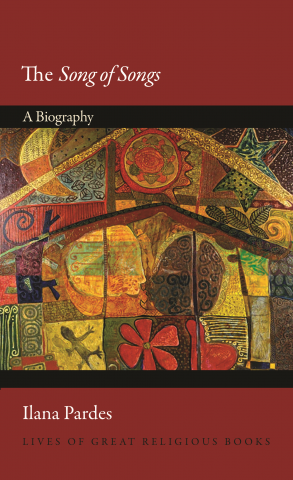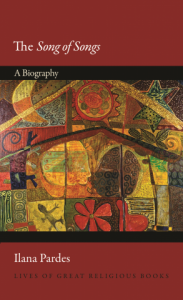The Tanakh’s “Song of Songs,” “Canticle of Canticles,” “Song of Solomon” is among its steamiest sections – a beautifully erotic poem that makes no reference to JHVH at all. And yet when the Tanakh was being compiled in the second century e.v. and some of the compilers objected to including it Rabbi Akiva insisted “All the writings are holy, but the Song of Songs is the Holy of Holies.” Its inclusion is a prime example of sex being perceived as a pathway to the Divine. Earlier this year, Princeton University Press published The Song of Songs: A Biography by Ilana Pardes the Katharine Cornell Professor of Comparative Literature at the Hebrew University of Jerusalem. The publisher’s site states:
The Song of Songs has been embraced for centuries as the ultimate song of love. But the kind of love readers have found in this ancient poem is strikingly varied. Ilana Pardes invites us to explore the dramatic shift from readings of the Song as a poem on divine love to celebrations of its exuberant account of human love. With a refreshingly nuanced approach, she reveals how allegorical and literal interpretations are inextricably intertwined in the Song’s tumultuous life. The body in all its aspects—pleasure and pain, even erotic fervor—is key to many allegorical commentaries. And although the literal, sensual Song thrives in modernity, allegory has not disappeared. New modes of allegory have emerged in modern settings, from the literary and the scholarly to the communal.
Offering rare insights into the story of this remarkable poem, Pardes traces a diverse line of passionate readers. She looks at Jewish and Christian interpreters of late antiquity who were engaged in disputes over the Song’s allegorical meaning, at medieval Hebrew poets who introduced it into the opulent world of courtly banquets, and at kabbalists who used it as a springboard to the celestial spheres. She shows how feminist critics have marveled at the Song’s egalitarian representation of courtship, and how it became a song of America for Walt Whitman, Herman Melville, and Toni Morrison. Throughout these explorations of the Song’s reception, Pardes highlights the unparalleled beauty of its audacious language of love.


